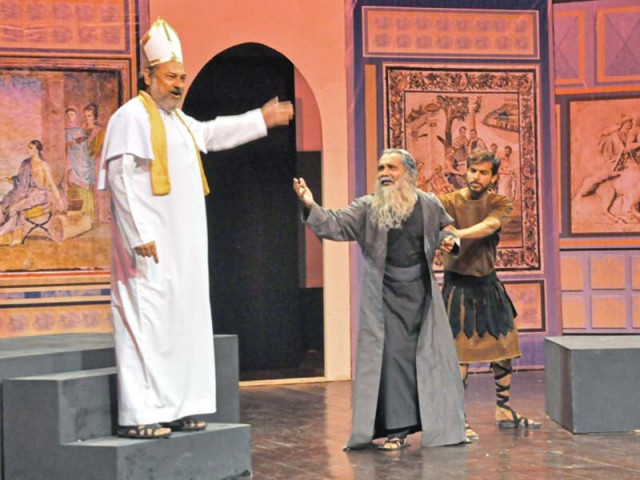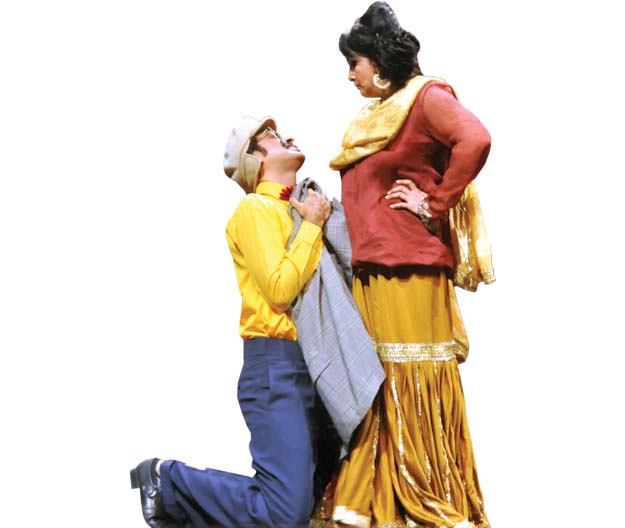‘Khota Sikka’ from Kashmir wins applause in Islamabad
Droves come to PNCA to watch stage performance of drama groups

Actors perform in different plays during the ongoing drama festival at PNCA. PHOTO: EXPRESS
On Friday Kashmir Theatre from Mirpur staged a play titled Khota Sika or useless coin.
Play written and directed by MB Lone is a story of a simple man who does not know how to deal with crooked people around him.
Being exploited by everyone, even his wife takes advantage of his position and forces him to do wrong deeds. Then comes an educated girl to his rescue and guide him to take decisions which are in favour of the nation and country.
It was a good effort and very much appreciated by the audience. Anal Haq by Indus Theatre Group and Lahu Aur Qaleen by Batin Farooqi Group will be staged on November 5 at 05:30pm and 06:30pm respectively.
According to the organisers the National Theatre Festival 2017 started attracting large audiences in droves.
Earlier, students of the National Academy of Performing Arts (NAPA) also staged two plays in the festival, “Guriya Ghar” (Doll House) and “Yahudi Ki Larki” (Jew’s Daughter) and got big applause from the audience.
Both plays have rightfully entertained the audience with classical flair of the theatrical performances.
Guriya Ghar is an adaptation of the classical play ‘A Doll’s House’ written by Danish playwright Henrik Ibsen in 1879. The actual characters included Nora, Torvald Helmer, Krogstad, Mrs Linde, Dr Rank and two children Anne-Marie and Helene.

The play was premiered on 21 December 1879 at the Royal Theatre in Copenhagen, Denmark. The thematic play revolves around the awakening of a middle-class wife and mother about their roles in the socio-cultural context.
The stage setting is the home of the Helmer family in an unspecified Norwegian town or city, circa 1879. It is a three-act play and world’s most performed one that significantly deals with the fate of a married woman, who at the time in Norway lacked reasonable opportunities for self-fulfilment in a male dominated world. It aroused a great sensation at the time, and caused a “storm of outraged controversy” that went beyond the theatre to the world newspapers and society.
“Yahudi ki larki” is an Urdu classical play written by the Agha Hashar who belonged to the Parsi tradition of theatre. Parsi theatre is a generic term for an influential theatre tradition, staged by Parsis, and theatre companies largely-owned by the Parsi business community, which flourished between 1850 and 1930s. The plays were in Gujarati, Hindi and Urdu, and after its beginning in Bombay, soon it developed into various travelling theatre companies, which toured across India popularising proscenium-style theatre in regional languages.
The theatre diminished in popularity, with arrival of talkies era in Hindi cinema in 1930s. Post-independence, it experienced a revival in the 1950s, much like theatre in the rest of the India.
Yahudi Ki Larki directed by Khalid Ahmed, is a symbolic play that reflects the diverse connotations of oppression and aggression in society. The play suggests that actualities could differ from what usually we may presume about the people based on the conventional notions about them. Some of the Jews could be better human beings than the Romans. The justice values could be different for the people living in different tiers of society. The cast of the play included Kashif Hussain, Kulsoom Aftab Ahmed khan, Maria Sa’ad Faridi, Samhan Ghazi, Harris Khan, Akbar Islam, Nazar ul Hassan, Mahjabeen Rehman, Aamir Naqvi, Farhan Alam, Zarqa Naz, Muhammad Faraz Chotani, Usman Mazhar, Hammad Khan, and Aisha Hassan.
The play was also enriched by the classical music played by a group of students including Mahjabeen Rehman, Hammad Khan, Asia Alam, Raheel Ahmed, Zarqa Naz while the tabla and harmonium were played by Saagar and Julian Qaiser. Jamil Afridi designed the sets while the dances were choreographed by Mohsin Babar and the costumes were designed and prepared by Maha Ali and Pervaiz Iqbal.
(With additional input by APP)
Published in The Express Tribune, November 4th, 2017.



















COMMENTS
Comments are moderated and generally will be posted if they are on-topic and not abusive.
For more information, please see our Comments FAQ